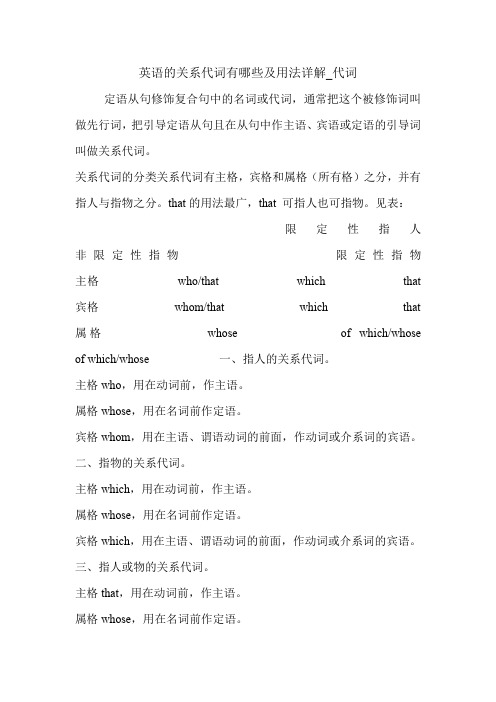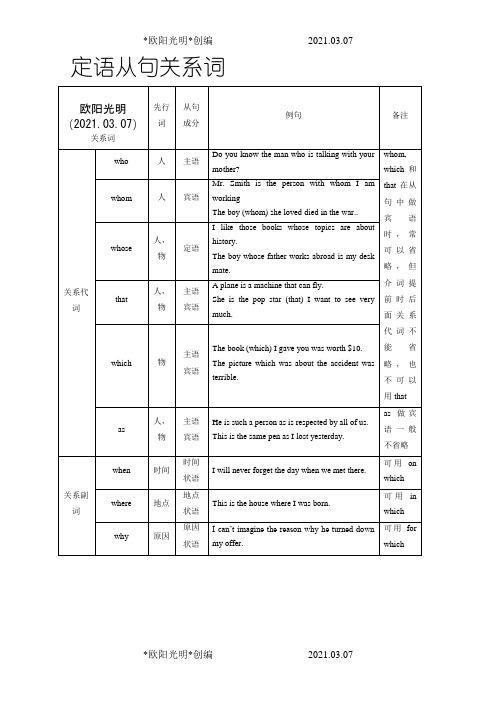关系代词一览表
英语代词表格

英语代词表格一、人称代词人称代词用于指代人,有主格、宾格和所有格三种形式。
主格用于主语,宾格用于宾语,所有格用于表示所有关系。
1. 主格人称代词:I(我), you(你/你们), he(他), she(她), it(它),we(我们), they(他们/她们/它们)2. 宾格人称代词:me(我), you(你/你们), him(他), her(她), it(它), us(我们), them(他们/她们/它们)3. 所有格人称代词:my(我的), your(你的/你们的), his(他的), her(她的), its(它的), our(我们的), their(他们的/她们的/它们的)二、指示代词指示代词用于指代特定的人或事物,有近指和远指两种形式。
1. 近指指示代词:this(这个), these(这些)2. 远指指示代词:that(那个), those(那些)三、疑问代词疑问代词用于构成特殊疑问句,引导疑问词。
1. 谁或哪些人:who(谁), whom(谁,宾格形式), whose(谁的,所有格形式)2. 什么或哪些事物:what(什么), which(哪一个)3. 多少或多少个:how many(多少个), how much(多少)四、关系代词关系代词用于引导定语从句,连接主句和从句。
1. 人:who(谁),whom(谁,宾格形式),whose(谁的,所有格形式)2. 物:which(哪一个),that(那个)3. 人或物:whoever(无论谁),whomever(无论谁,宾格形式),whichever(无论哪一个),that(那个)五、不定代词不定代词用于指代不确定的人或事物。
1. 某些或某些人:some(一些),any(任何一个),anyone(任何人),everyone (每个人),someone(某人)2. 没有或没有人:no(没有),none(没有人/没有任何事物),nobody(没有人),nothing(没有任何事物)3. 所有或每一个人:all(所有),every(每一个),everyone(每个人),everything(每一件事物)4. 某一个或某一个人:one(一个),ones(一些),each(每一个),either(两者中的任何一个),neither(两者都不)5. 另一个或另一个:other(另一个),others(其他的),another(另一个),the other(另一个),the others(其他的)六、反身代词反身代词用于表示动作的承受者与执行者一致。
代词表格

⒈指代不执行别的人或上文事物;
⒉在英语中,we、you和they都可泛指人们,可译为“我们”、“你们”、“他们”;
⒊①she可以用来代表国家、船只、大地、月亮;
②男(女)主人常用she∕her(he∕his)代指自己的爱车、宠物等;
③在寓言、童话故事中,温柔善良的动物常用she替代,凶猛粗野的动物常用he替代.
单数
主格 宾格
复数
主格 宾格
⒈主格I在句中的任何位置都必须大写;
⒉在英语中,如果同时多个人称代词时,如果是单数并列,需要按照“你”、“他∕她”、“我”的顺序排列;复数并列则按照“我们”、“你们”、“他们”的顺序排列;
⒊it有时可指不知性别的“婴儿或小孩”或对人物身份进行推测;
⒋人称代词用于as和than之后,如果把as和than看做介词,此时往往用宾格;如果是连词,则往往用主格;
a.主语从句: It hasn’t been announced who won the prizes.还没宣布谁获奖。Itis clear enough what she meant.她是什么意思很清楚。b.宾语从句:I don’t care what they think.他们怎么想我不管。Ask her which he wants.问她要哪一个。c.表语从句:The question is who(m) we should trust.问题是我们应当相信谁。What I want to know is which road we should take.我想知道的是我们应走哪条路。 d,状语从句Whereveryougo,whatever you do, I will be right here waiting for you.无论你去哪里,无论你做了什么,我都会在这里等你。e,连代词还可引起不定式,都用作宾语或介词的宾语: Tell him what to do. 告诉他怎样做。 Lucy can’t decide which to choose.露西不能决定选哪个好。They exchanged views on the question of whom to elect. 他们就该选谁的问题交换了意见。
英语的关系代词有哪些及用法详解_代词 英语语法.doc

英语的关系代词有哪些及用法详解_代词定语从句修饰复合句中的名词或代词,通常把这个被修饰词叫做先行词,把引导定语从句且在从句中作主语、宾语或定语的引导词叫做关系代词。
关系代词的分类关系代词有主格,宾格和属格(所有格)之分,并有指人与指物之分。
that的用法最广,that 可指人也可指物。
见表:限定性指人非限定性指物限定性指物主格who/that which that 宾格whom/that which that 属格whose of which/whose of which/whose 一、指人的关系代词。
主格who,用在动词前,作主语。
属格whose,用在名词前作定语。
宾格whom,用在主语、谓语动词的前面,作动词或介系词的宾语。
二、指物的关系代词。
主格which,用在动词前,作主语。
属格whose,用在名词前作定语。
宾格which,用在主语、谓语动词的前面,作动词或介系词的宾语。
三、指人或物的关系代词。
主格that,用在动词前,作主语。
属格whose,用在名词前作定语。
宾格that,用在主语、谓语动词的前面,作动词或介系词的宾语。
四、其它关系代词。
but,as,than作关系代词引导定语从句but既可指人,也可指物,常在定语从句中充当主语。
but本身含否定的意思,其作用相当于that /which /who...not。
它前面的主句通常有否定的词(如:no,not,little,few,hardly等)。
but引导的肯定定语从句和否定的主句连用,达到强烈肯定的修饰效果。
例如:There is no mother but loves her own children.(=There is no mother that/who does not love her own children.)没有不爱自己孩子的母亲。
as既可指人,也可指物,常在限制性定语从句中充当主、宾、表语。
as引导的定语从句的先行词前面常有as /such /the same等修饰词。
2021年定语从句关系词表格

人
宾语
Mr. Smith is the person with whom I am working
The boy (whom) she loved died in the war..
whose
人,物
定语
I like those books whose topics are about history.
物
主语
宾语
The book (which) I gave you was worth $10.
The picture which was about the accident was terrible.
as
人,物
主语
宾语
He is such a person as is respected by all of us.
可用in which
why
原因
原因
状语
I can’t imagine the reason why he turned down my of源自er.可用for which
定语从句关系词
欧阳光明(2021.03.07)
关系词
先行词
从句
成分
例句
备注
关系代词
who
人
主语
Do you know the man who is talking with your mother?
whom, which和that在从句中做宾语时,常可以省略,但介词提前时后面关系代词不能省略,也不可以用that
The boy whose father works abroad is my desk mate.
that
人,物
主语
法语代词与动词时态变位一览表

法语代词与动词时态变位一览表法语代词:1.人称代词:主语人称代词:je, tu, il, elle, on, nous, vous, ils, elles重读人称代词:moi, toi, lui, elle, soi, nous, vous, eux, elles直接宾语人称代词:me, te, le, la, se, nous, vous, les间接宾语人称代词:me, te, lui, nous, vous, leur2.副代词:en, y3.疑问代词:qui, que, quoi, lequel, laquelle, lesquels, lesquelles4.指示代词:celui (-ci, -là) ; celle (-ci, -là) ; ceux (-ci, -là) ; celles (-ci, -là) ; ce, ceci, cela,ça5.关系代词:qui, que, quoi, dont, où, lequel, laquelle, lesquels, lesquelles6.泛指代词:on, quelqu’un, personne, tout le monde, quelque chose, rien, chacun, nul(le), l’un(e), l’autre,les un(e)s, les autres, d’autres, tout, tous, toutes7.中性代词:le8.主有代词:le mien, la mienne, les miens, les miennes;le tien, la tienne, les tiens, les tiennesle sien, la sienne, les siens, les siennesle nôtre, la nôtre, les nôtres;le vôtre, la vôtre, les vôtres;le leur, la leur, les leurs法语形容词:品质形容词:grand, petit, nouveau, ancien, bon, mau vais…..主有形容词:mon, ma, mes, ton, ta, tes, son, sa, ses,notre, nos, votre, vos, leur, leurs指示形容词:ce, cet, cette, ces疑问形容词:quel, quelle, quels, quelles泛指形容词:aucun, autre, certain, chaque, différents, plusieurs, nul, tel, tout…感叹形容词:quel, quelle, quels, quelles动词时态变位:最近将来时:aller + 动词原形最近过去时:venir de + 动词原形直陈式:parler 为例现在时:(一组动词去掉词尾er + -e ;-es ;-e ;-ons ;-ez ;-ent)je parle ; tu parles ; il parle ;nous parlons ; vous parlez ; ils parlent(二组动词去掉词尾ir + -is ; -is ; -it; -issons ; -issez ; -issent)复合过去时:(助动词avoir或être的直陈式现在时+过去分词)j’ai parlé ; tu as parlé ; il a parlé ;nous avons parlé ; vous avez parlé ; ils ont parlé.未完成过去时:(去掉复数第一人称结尾-ons + -ais ; -ais ; -ait ;-ions ; -iez ; -aient)je parlais ; tu parlais ; il parlait ;nous parlions ; vous parliez ; ils parlaient愈过去时:(助动词avoir或être的直陈式未完成过去时+过去分词)j’avais parlé; tu avais parlé ; il avait parlé;nous avions parlé; vous aviez parlé; ils avaient parlé简单过去时:(一组动词去掉词尾er + -ai ; -as ; -a ; -âmes ; -âtes ; -èrent)je parlai ; tu parlas ; il parla ;nous parlâmes ; vous parlâtes ; ils parlèrent(二组动词去掉词尾ir + -is ; -is ; -it ; -îme ; -îtes ; -irent)先过去时:(助动词avoir或être的直陈式简单过去时+过去分词)j’eus parlé; tu eus parlé; il eut parlé;nous eûmes parlé; vous eûtes parlé; ils eurent parlé.过去将来时:(动词将来时的词根+ -ais ; -ais ; -ait ; -ions ; -iez ; -aient)je parlerais ; tu parlerais ; il parlerait ;nous parlerions ; vous parleriez ; ils parleraient.过去先将来时:(助动词avoir或être的直陈式过去将来时+过去分词)J’aurais parlé; tu aurais parlé; il aurait parlé;nous aurions parlé; vous auriez parlé; ils auraient parlé;过去最近将来时:aller 的直陈式未完成过去时+ 动词原形过去最近过去时:venir的直陈式未完成过去时+ de + 动词原形简单将来时:(动词原形+ -ai ; -as ; -a ; -ons ; -ez ; -ont)je parlerai ; tu parleras ; il parlera ;nous parlerons ; vous parlerez ; ils parleront.先将来时:(助动词avoir或être的直陈式简单将来时+过去分词)j’aurai parlé; tu auras parlé; il aura parlé;nous aurons parlé; vous aurez parlé; ils auront parlé.条件式 :现在时:(动词将来时的词根+ -ais ; -ais ; -ait ; -ions ; -iez ; -aient)je parlerais ; tu parlerais ; il parlerait ;nous parlerions ; vous parleriez ; ils parleraient.过去时;(助动词avoir或être的条件式现在时+过去分词)j’aurai s parlé; tu aurais parlé; il aurait parlé;nous aurions parlé; vous auriez parlé; ils auraient parlé.虚拟式 :现在时:(去掉直陈式复数第三人称结尾-ent + -e ; -es ; -e ;-ions ; -iez ; -ent)que je parle ; que tu parles ; qu’il parl e ;que nous parlions ; que vous parliez ; qu’ils par lent过去时:(助动词avoir或être的虚拟式现在时+过去分词)que j’aie parlé; que tu aies parlé; qu’il ait parlé;que nous ayons parlé; que vous ayez parlé; qu’ils aient parlé;。
2023版外研社高中英语必选择性必修二代词表

2023版外研社高中英语必选择性必修二代词表一、代词的定义代词是一种用来代替名词的词语,它可以用来指代人、动物、事物等,并在句子中扮演特定的语法角色。
二、英语中常见的代词类型1. 人称代词人称代词用于代替人或人称的名词,分为主格和宾格两种形式。
主格用作主语或表语,宾格用作宾语或介词宾语。
- 主格代词: I, you, he, she, it, we, you, they- 宾格代词: me, you, him, her, it, us, you, them2. 物主代词物主代词用于代替名词所属的人或物,表示所有关系。
分为形容词性物主代词和名词性物主代词。
- 形容词性物主代词: my, your, his, her, its, our, your, their- 名词性物主代词: mine, yours, his, hers, its, ours, yours, theirs3. 反身代词反身代词用于强调或指示与主语有关的动作或行为。
- 反身代词: myself, yourself, himself, herself, itself, ourselves, yourselves, themselves4. 指示代词指示代词用于指代特定的人或物。
分为近指示代词和远指示代词。
- 近指示代词: this, that- 远指示代词: these, those5. 疑问代词疑问代词用于提问某个未知事物的身份或特征。
- 疑问代词: who, whom, whose, which, what6. 关系代词关系代词用于引导定语从句,表示与主句中某个名词或代词有关系的人或物。
- 关系代词: who, whom, whose, which, that7. 不定代词不定代词用于泛指不确定的人或事物。
- 不定代词: some, any, no, each, every, all, both, either, neither, one, another, other, few, many, several, both8. 相互代词相互代词用于表示彼此的关系或相互的动作。
定语从句关系词表格之欧阳歌谷创作
as做宾语一般不省略
关系副词
when
时间
时间
状语
I will never forget the day when we met there.
可用on which
where
地点
地点
状语
This is the house where I was born.
定语从句关系词
欧阳歌谷(2021.02.01)
关系词
先行词
从句
成分
例句
备注
关系代词
who
人
主语
Do you know the man who is talking with your mother?
whom, which和that在从句中做宾语时,常可以省略,但介词提前时后面关系代词不能省略,也不可以用that
The boy whose father works abroad is my desk mate.
that
人,物
主语
宾语
A plane is a machine that can fly.
She is the pop star (that) I want to see very much.
which
whom
人
宾语
Mr. Smith is the person with whom I am working
The boy (whom) she loveddied in the war..
whose
人,物
定语
I like those books whose topics are about history.
关系代词
关系代词用来引导定语从句。
它代表先行词,同时在从句中作一定的句子成分。
关系代词有主格,宾格和属格之分,并有指人与指物之分。
目录关系代词的分类关系代词的基本用法1. (1)引导定语从句2. (2) which为其先行词3. (3)其他用法三个特殊关系代词语法注意用法详解更多信息展开关系代词的分类关系代词的基本用法1. (1)引导定语从句2. (2) which为其先行词3. (3)其他用法三个特殊关系代词语法注意用法详解更多信息展开编辑本段关系代词的分类关系代词有主格,宾格和属格之分,并有指人与指物之分。
that的用法最广,that 可指人也可指物。
见表:?限定性指人非限定性指物限定性指人或指物主格who/thatwhich/thatthat宾格whomwhich/thatthat属格whoseof which/whoseof which/whose 编辑本段关系代词的基本用法(1)引导定语从句关系代词代表先行词,同时在从句中作一定的句子成分,例如:The girl whom I spoke to is my cousin. 跟我讲话的姑娘是我表妹。
(该句中whom 既代表先行词the girl,又在从句中作介词to的宾语。
)??英语This is the pencil whose point is broken.这就是那个折了尖的铅笔。
(whose 指物,在限定性定语从句中作定语)He came back for the book which he had forgotten.他重新回来都忘记了他的那本书。
(which指物,在限定性定语从句中作宾语,可以省略)(2) which为其先行词例如:He said he saw me there, which was a lie.他说在那儿看到了我,纯属谎言。
(3)其他用法关系代词that在从句中作宾语或表语时可省略,例如:I've forgotten much of the Latin I once knew.我过去懂拉丁语,现在大都忘了。
06.定语从句-高考英语一轮复习语法知识
2.只用which不用that的情况 (1)关系代词前有介词时。 This is the reference book of which the teacher is speaking. (2)引导非限制性定语从句时。 Crusoe’s dog, which was very old, became ill and died.
考点2 “介词+关系代词”引导的定语从句 【要点归纳】
在“介词+关系代词”结构中,关系代词若是表示人,就只能用whom;关系代词 若是表示事物,就只能用which。 Where is the supermarket in which you bought the laptop last week? Do you know the lady with whom our manager is talking in the office? 【特别提示】
在正式的文体中,“介词+关系代词”引导的定语从句可缩写成“介词+关系代 词+不定式”结构。 She had some money in the bank, with which she could help her mother.
【要点巩固】 ①(2024·韶关模拟) Then he took a break in an inn and ordered several dishes, among _w__h_ic_h__there was fried shrimp. ②(2023·浙江高考·1月卷) There’s never a stage at _w_h_i_c_h__the system knows what it’s talking about. ③(2023·新高考Ⅱ卷改编) In contrast to our increasingly networked lives in _w__h_ic_h__ the information we consume is monitored and tracked, a printed book still offers the chance of a wholly private, “off-line” activity.
高中英语语法系统讲解之九定语从句
定语从句定语从句在复合句中修饰一个名词或代词。
被定语从句修饰的名词或代词叫做“先行词”。
引导定语从句并作定语从句中的一个成分的词叫做“关系词”。
常见的关系词有关系代词(who,whom,whose,that,which等)和关系副词(when,where,why等)。
关系词有两个作用:1、放在先行词与定语从句中间起连接作用,引导定语从句;2、代替先行词在其引导的定语从句中充当一定的句子成分,并与先行词保持数的一致。
关系代词引导的定语从句温馨提示:“whose + 名词”这一结构在定语从句中既能作主语,又能作宾语,whose的先行词常用来指人,但有时也可以用来指具体事物或抽象概念,这时可以与of which结构互换,词序是“the+名词+ of which”。
如Please pass me the book whose cover (the cover of which) is green.3. 关系副词的用法○1由when引导:when指时间,在从句中作时间状语,它所修饰的先行词有time,day,morning,night,week,year等。
如From the time when he was little, he had known what he wanted to be when he grew up.○2由where引导:where指地点,在从句中作地点状语,它的先行词有place,spot,street,room,city,country等。
如Is this the room where you were living last winter?Beijing is the place where I was born.○3由why引导:why表示原因,常用在先行词reason后面。
如The reason why he said that is quite clear.I don’t know the reason why she looks unhappy today.4. 使用关系副词时应注意的几点:○1有些先行词虽不表具体的地点,但表达一种“阶段、境地、形势、地步”,也可用where 来引导定语从句。
